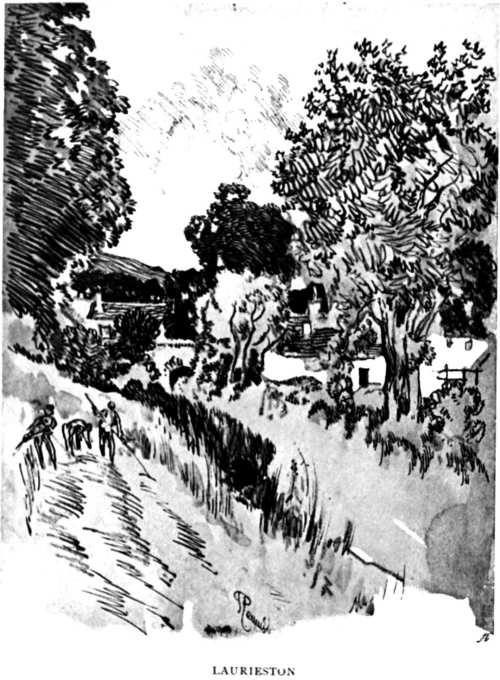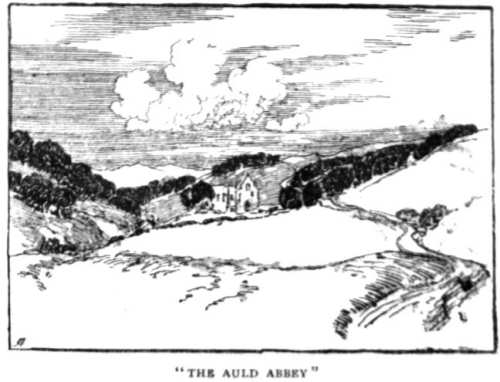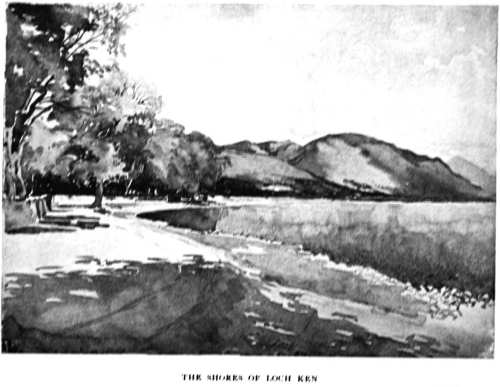|

WOOOHALL LOCH
Barbarlsms.
IT is vain, I fear, to call it Grenoch–as it should be
called. A certain name-changing fiend brought into our Erse and Keltic
Galloway a number of mongrel names, probably some Laird Laurie with a bad
education and a plentiful lack of taste, who, among other iniquities, called
the ancient Clachan-of-Pluck after himself–Laurieston. His mansion·house he
changed from the ancient and honourable "Grenoch," by which name it stands
in Pont's map of (about)
1611 to the commonplace Woodhall. Later the loch had a like
fortune. Loch Grenoch became Woodhall Loch (or in the folk speech of the
parish, Wudha' Loch). Farther afield we have a crop, happily thin sown and
soon finding away of Summerhills, Parkhills, Willowbanks, and such like–of
which that most to be regretted is the merging of the ancient name of the
Duchrae estate in that of the mansion-house of Hensol, a word which has no
historical connection with Galloway, but merely preserves a souvenir (Jf ltv;
f;arly yr)uth f)f a late proprietor.
But Woodhall Loch (after you have become accustomed to the
barbarism) smells as sweet, and its water ripples as freshly as ever did
that of Loch Grenoch–which at least is some comfort.
Setting out northward away from Laurieston, there lie
before you five miles of the most changefully beautiful road in Scottland,
every turn a picture, and in the season every bank wonder of flowers. If the
journey is prolonged to the borough of New Galloway itself, the marvel
becomes only the more marvellous, the changes only the more frequent I have
heard an artist say that a lifetime might be judiciously spent in painting
those ten miles of road without once leaving the highway, and yet the
painter need never repeat his effect.
The fIrst mile to the beginning of the loch itself is
through scenery curiously reminiscent of some parts of central France–the
valley of the Creuse, for instance, George Sand's country –or some of the
lower tributaries of the Tarn. The tall poplars in front of the ruined
smithy, the little bum that trips and ambles for a few hundred paces beside
the traveller and then is lost, hurrying off into the unknown again as if
tired of being overlooked–all these are more French than Scottish.

Myriads of wild flowers throng on every side, at all
seasons of the year when wild flowers can be found in Scotland–indeed many
even in winter.
But as I write I am reminded that remarkable and historical
events happened close to this place where now we pause to look about us,
Greystone.
The house to the right among the trees is Greystone, which
in the days of my youth boasted a genuine ghost–a Lady in White who walked
up and down among the trees, chiefly by moonlight, when I took care not to
be in the neighbourhood. Besides which, the owner and builder of the
beautifully fitted mills, barns, outhouses, ponds–a certain General J –,
much held in awe by all
schoolboys, used to come on Sundays with a gay company and a
team of four horses, and depart (as we boys firmly believed) with a forked
tail hid under his coat, and leaving in his Sabbath-breaking wake a faint
but unmistakable odour of brimstone.
Greystone, or North Quintainespie, was never finished in
the builders lifetime. The exquisite machinery rusted in the mills and
barns. Not a wheel ever turned. Not a sheaf of corn was ever thrashed. The
byres and stables stood locked and silent till a later and better day arose,
when ghosts were laid and Greystone became no more a marvel, but only one
home among many. But at the time the place feared us more than the ministers
sermons, or even the crack of the schoolmasters dog-whip.
Here too, at the beginning of these better days, came a
certain small Sweetheart of mine to do her messages, deliver her orders,
drink her drink of milk, and return in haste to her own. And on that dusty
road a certain “Heart of Gold" was abased–abased in order to be exalted,
tried, and proven, all which is written in the book called “Sweetheart
Travellers," and need not be repeated here.
Farther along is Blates Mill, where (so they tell me) one
Leeb M'Lurg put up her remarkable notice concerning eggs, and held her siege
against her weasel-faced uncle Tim, ere the bull did its ultimate justice
upon him.
Yet a little farther on, its branches bent by the furious
blasts from the loch, stands at an angle of the road, the famous Bogle
Thorn. It seems somehow to have shrunk and grown commonplace since I used to
pass it at a run, with averted eyes, in the winter gloamings on my way home
from school.
The Bogle
Thorn.
Then it had for me the most tragic suggestions. A man, so
they said, had hanged himself upon it at some unknown period. He was to be
seen, evident against the drear dusk, a-swing from the topmost branches,
blowing out in the blast like a pair of trousers hung up to dry, or Dante's
empty souls in the winds of Hades.
Recently, however, I was glad to notice that Sweetheart had
not forgotten the old thrill of fear as we passed it on cycle-back, its
limbs black and spidery against a waning moon.
"In an incautious moment, once upon a time, I had informed
Sweetheart that on the branches of that tree, in years long past, when I
used to trudge past it on foot, there used to be seen little green men,
moping and mowing. So every time we pass that way Sweetheart requires the
story without variations. Not a single fairy must be added or subtracted.
Now, it happens that the road goes uphill at the Bogle Thorn, and to
remember a fairy tale which one has made up the year before last, and at the
same time to drive a tricycle with a great girl of five thereon, is not so
easy as sleeping, So, most unfortunately, I omit the curl of a green
monkey's tail in my recital, which a year ago had made an impression upon a
small girl's accurate memory. And her reproachful accent as she says, 'Oh,
father, you are telling it all different,' carries its own condemnation with
it." 1
Woodhall Loch is like many another. Half its beauty is in
the seeing eye. Yet not only the educated or the intellectual may see. At
the close of this chapter, I will quote what feelings were excited in the
breast of a country lout by the solemnities of night as viewed from the Crae
Bridge.
But for others who think more of themselves than did Ebie
Farrish the ploughman, the art of admiring nature is chiefly a matter of
habit and leisure. The scytheman, the ploughman, the lowland hind, even the
ordinary farmer, see little of the mysteries of that Nature in the midst of
which they work, dull-eyed as the browsing bullocks.
The man of the high hills is vastly different. There are
few shepherds insensible to the glamour of the mountains and the strange
wild poetry of their occupation. But to the lover, the poet, to the
intelligent townsman all things seem to speak. Ralph Peden, the city
divinity student, lying well content under a thorn-bush above the loch, drew
in that heather-scent which makes the bees tipsy and sets the grass-
1 “Sweetheart Travellers," p. 224. (Wells Gardner, Darton, &
Co.)

hoppers chirring in the long grass by the lochside. It caused
a glamour to come into his head also, in spite of all the philosophies,
I know a bank, where the wild thyme grows–with an
infinitude of other things. You will find it past Blates Mill, past the
Bogle Thorn, just where the loch opens out, and when, standing on tiptoe at
the side of the road, you can see far away, set on the selvage of the
northern moorland, the chimneys of the Duchrae.
Now look down. Between you and the rippling water what a
blaze of colour! You will hardly find such a wealth of flowers anywhere else
in Galloway. The loch, alternate white and blue according as the sunlight or
the breeze catches it, stretches away for all its length of three miles,
cloud and firwood mirroring themselves upon it. If it be June, the first
broad rush of the ling will already be climbing the slopes of the Crae Hill
opposite to you–a pale lavender near the lochside, deepening to crimson on
the dryer slopes where the heath-bells grow shorter and stand thicker
together. At the upper end of the loch, scarcely yet in view, the wimpling
Lane of Duchrae glides away as discreetly from the sleeping lake as if it
were eloping and feared to wake an angry parent. The whole range of hill and
wood and water is drenched in sunlight. Yet everywhere silence clothes it
like a garment, and the wind that blows hither and thither is sweet with the
wild free scent of the moors.
Flowerland.
I cannot even pretend to catalogue the flowers one may hope
to find here–I had almost said, at all times of the year. The outrush of
golden yellow across these braes, gorse and whin, pranked Iike a gay lady,
gave me my first sense of gladness in nature" I used to hurrah all the way
home from school, just because everything–the banks, the knowes, the
roadside, all were of the gladsome yellow. It was my true age of gold, and
even now something throbs in my throat as I think of it. It was the
head-time of all the year–that and the long rush through the spring grass,
when, for the first time, stockings were taken off, and the bare white feet
felt the cool thresh of the close-set herbage, soft and moist and velvety.
It is true that merely to have bought and to have read so
much of “Raiderland"–a book wholly given up to the seeing of the eye, argues
an intelligence in the reader wholly different from that of Ebie Farrish,
the ploughman. But still it will do no harm to remember that, with such
beauties ready to her hand, Nature does work its mysterious work on the
dullest and most animal of human beings.
Ebie has been ”night-raking," as it is expressly called in
Galloway, and now is on his way back to his own proper couch.
“But returning home in the coolness of this night, the
ploughman was, for the time being, purged of the grosser humours which come
naturally to strong, coarse natures, with physical frames ramping with youth
and good feeding. He stood long looking into the Lane water, which glided
beneath the bridge and away down to the Dee without a sound.
“He noted where, on the broad bosom of the loch, the
stillness lay grey and smooth like glimmering steel, with little puffs of
night wind purling across it, and disappearing like breath from a new
knife-blade. He saw also where the smooth satin plain rippled to the first
water-break, as the stream collected itself, deep and black, with the force
of the current behind it, to flow beneath the arch. When Ebie Farrish came
to the bridge he was no more than a material Galloway ploughman, satisfied
with his night's conquests and chewing the cud of their memory.
“He looked over. He saw the stars, which were perfectly
reflected a hundred yards away on the smooth expanse, first waver, then
tremble, and lastly break into a myriad delicate shafts of light, as the
water quickened and gathered. He spat in the water, and thought of trout for
breakfast. But the long roar of the rapids of the Dee came to him over the
hill, and brought a feeling of stillness with it, weird and remote.
Uncertain lights shot hither and thither under the bridge, in strange gleams
and reflections. The ploughman was awed.
He continued to gaze. The stillness closed in upon him. The
aromatic breath of the pines seemed to cool him and remove him from himself.
He had a sense that it was the Sabbath morning, and that he had just washed
his face to go to church. It was the nearest thing to worship he had ever
known. Such moments come to the most material, and are their theology. Far
off a solitary bird whooped and whinnied. It sounded mysterious and unknown,
the cry of a lost soul. Ebie Farrish wondered where he would go to when he
died. He thought this over for a little, and then he concluded that upon the
whole it were better not to dwell on that subject. But the crying on the
lonely hills awed him. It was only a Jack snipe, from whose belated nest an
owl had stolen two eggs. Nevertheless it was Ebie Farrish's good angel. Of a
truth there was that in the world which had not been there before for him.
And it is to his sweetheart's credit, that when Ebie was most impressed by
the stillness and most under the spell of the night, he thought of her. He
was only an ignorant, godless, dull-natured man, who was no more moral than
he could help. But it is both a testimonial and a compliment when such a man
thinks of a woman in his best and most solemn moments.
“A trout leaped in the calm water, and Ebie stopped
thinking of the eternities to remember where he had baited a line. Far off a
cock crew, and the well-known sound warned Ebie that he had better be
drawing near his bed. He raised himself from the copestone of the parapet,
and solemnly tramped his steady way up to the 'onstead' of Craig Ronald,
which took shape before him on the height as he advanced like a low,
grey-bastioned castle." 1
1 “The Lilac-Sunbonnet," p.168. (T. Fisher Unwin.)
|

